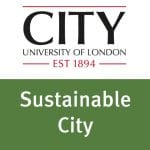By Anouk Dijkman (Interim Sustainability Officer)

Last week marked the start of Fairtrade Fortnight 2022, an annual campaign galvanising schools and universities across the UK. The Fairtrade Foundation works with farming co-operatives, businesses and governments to improve working conditions and the ethics behind our food systems.
Join us this week to learn more about what the foundation is doing about the often-unfair conditions of workers behind coffee, chocolate, tea, cotton, certain fruit and veg and more!
With City becoming a Global Goals signatory, our sustainability team wanted to take this second Fairtrade Fortnight week as an opportunity to hone in on some of the ways in which The Fairtrade Foundation helps working towards the Global Goals.
Global Goal 1: No Poverty

The Fairtrade Minimum Price is one of the foundation’s various standards, providing financial security for fair trade farmers through a minimum produce price guarantee. This helps limiting the risk of sudden market changes for 1.7 million farmers globally, by guaranteeing a decent income for their crops.
Global Goal 2: Zero Hunger

In addition to the Fairtrade Minimum Price, the foundation also provides technical support and education to smallholders, who considerably contribute to global food production. Both initiatives enable farmers to make their businesses more resilient, reducing poverty risks for the farmers and global food supply deficiencies due to failed crops.
Global Goal 4: Quality education

Education amongst farmers is promoted via fair trade in several ways: First of all, through investment in programmes promoting training and learning opportunities for the producers themselves, improving their business outcomes. More indirectly, initiatives like the Fairtrade Premium funds can be spent on the education of worker’s children, facilitating schooling from an early age onwards. See here how Fairtrade has improved outcomes for tea producers in East-Africa.
Global Goal 5: Gender Equality

Fairtrade Standards are a set of norms for farmers, workers, traders and other stakeholders across the fairtrade supply chain. Sexual discrimination or harassement is one of the inequalities the standards help prohibit to create fairer food systems, where women are estimated to make up between 60-80% of the farm labour. Additionally, the foundation has set up Gender Leadership Schools, aiming to improve gender balance, promote equal pay and empower women to lead the way in their communities.
Click here for a short film bringing to the front some of the challenges women in the cocoa industry are facing.
Global Goal 8: Decent work and Economic Growth

Fair trade promotes better working conditions amongst farmers, for example by preventing child and forced labour and improving terms of employment. This is especially relevant for an industry which is losing its attractiveness as a career choice amongst young people. Additionally, the previously mentioned educational benefits the foundation delivers help towards the safer use of chemicals and equipment.
Global Goal 12: Responsible Consumption and Production

On the consumer’s side, the Fairtrade label contributes towards a wider availability of ethical products. Fairtrade’s ethical qualities are dual: While producers are expected to live up to Fairtrade’s environmental and social standards, buyer and trader standards ensure fair and transparent contracts, wages, sourcing and more.
Global Goal 13: Climate Action

Many of Fairtrade’s producers are located in the global south, on the frontline of the climate crisis. To address the consequences of climate change they are expected to experience particularly heavily, the foundation works with a range of stakeholders to improve climate adaptation and resilience amongst the farmers they support. At the same time, the Fairtrade Standards for small-scale producers ensure environmentally conscious practices, such as tree planting, efficient irrigation management and crop diversification, to avoid the further degradation of the natural resources we will become increasingly dependent on as the climate crisis progresses.
Global Goal 17: Partnerships for the Goals

The Fairtrade Foundation leverages its global position and relationships to improve outcomes for small farmers, often disadvantaged in supply chains dominated by larger companies. By bringing together their wide network of farmers, workers, consumers, trade unions, businesses, governments and campaigners, the foundation also helps support a coordinated effort in working towards the UN’s Global Goals.
Curious to learn more about fair trade and ethics? Join us on the 24th of March 2022, 18.30-21.00, for an interactive evening unravelling the colonial legacy of food systems with guest speaker Adam Gardner, Head of Campaigns at The Fairtrade Foundation, and chair Rosalind Sharpe, Director of the Food Research Collaboration (FRC) at the Centre for Food Policy at City.
In the meantime, keep an eye out for special 12 app fair trade discounts on campus, and make sure to check out the foundation’s The World You Want festival for inspiring talks and workshops taking place over the coming week.

May 26, 2022 4:34 pm
That’s so useful.
شركة ترميم منازل بالرياض
December 27, 2022 7:26 pm
cambridge university